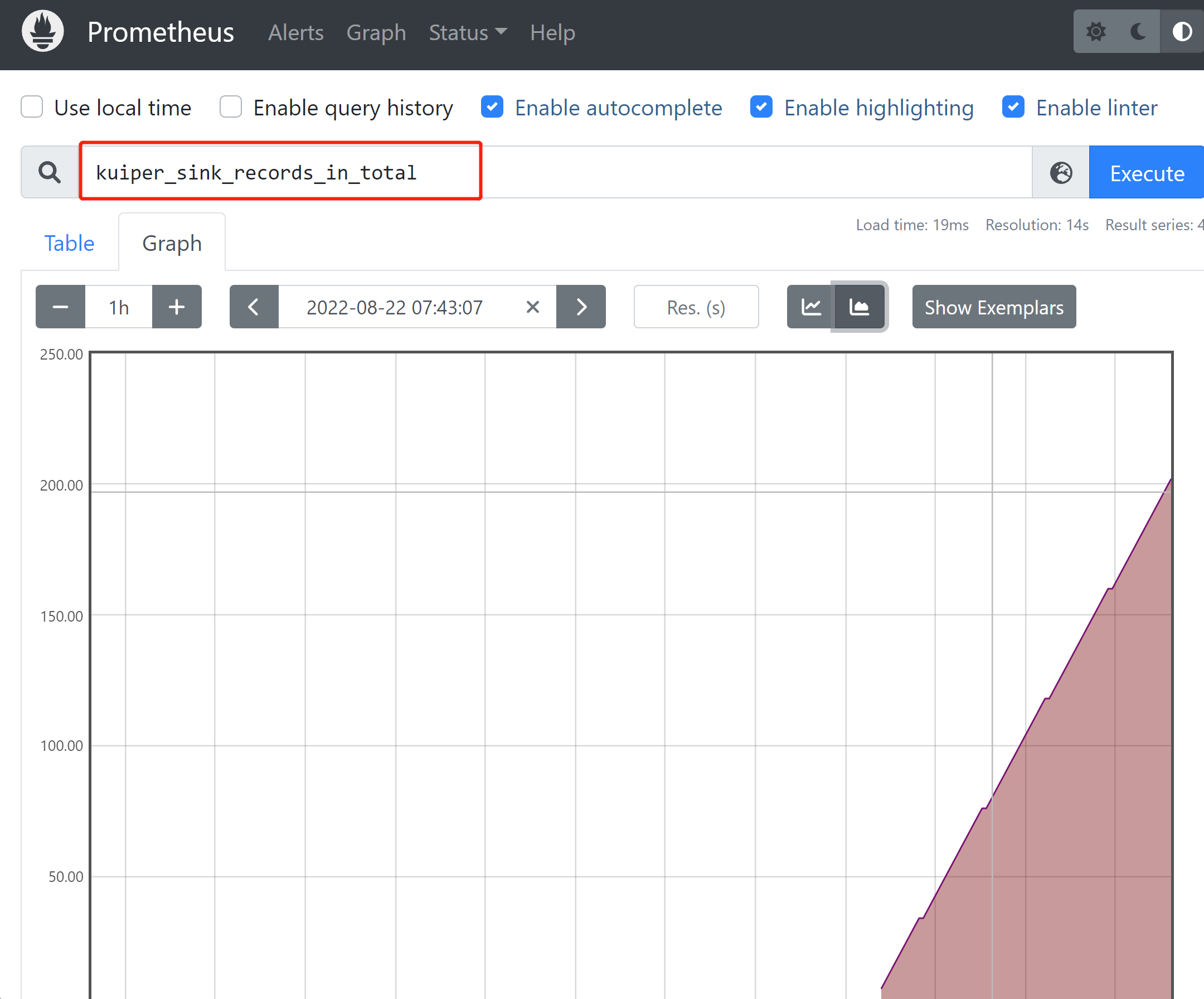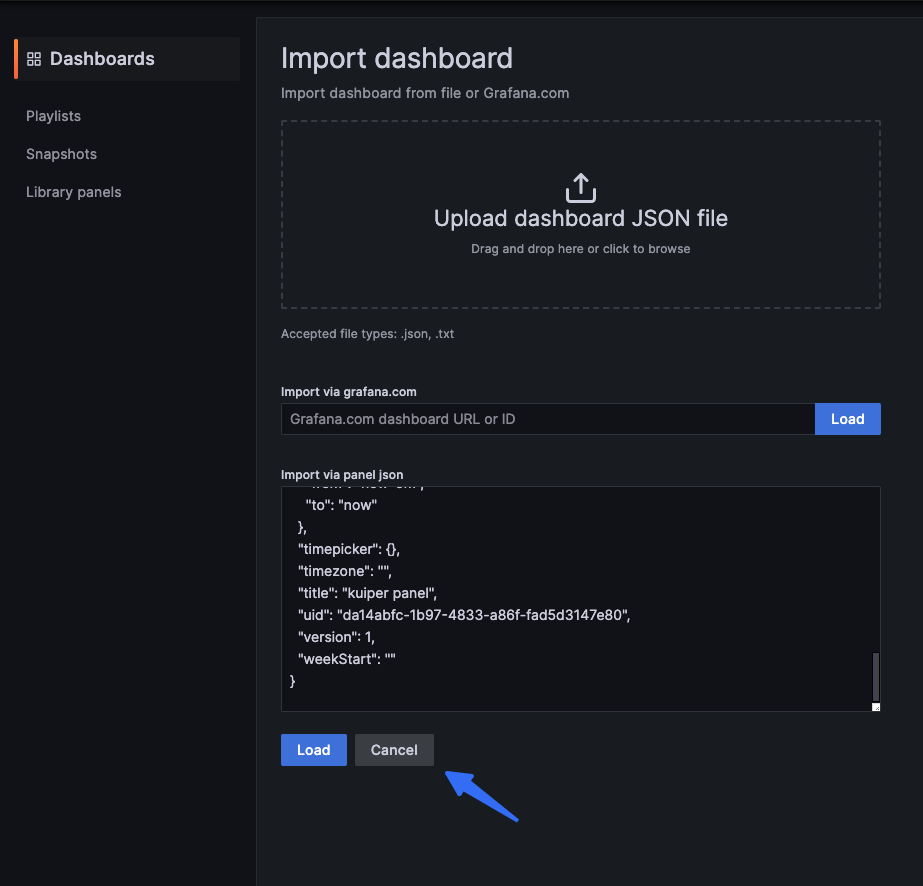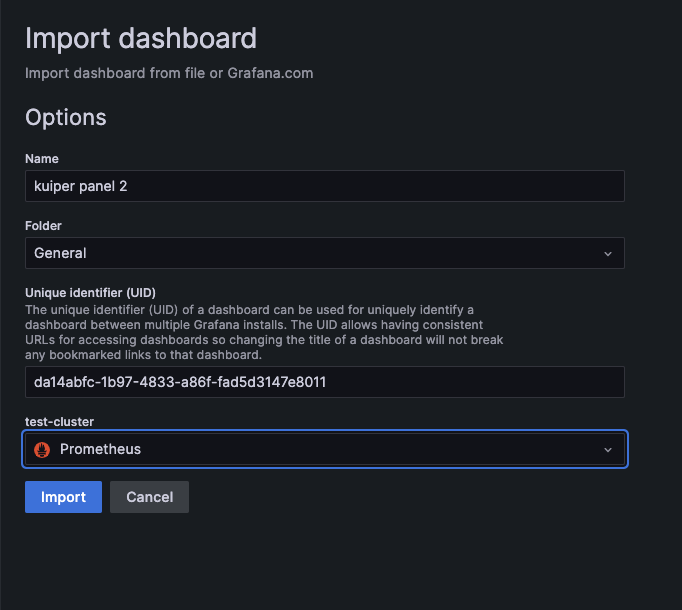使用 Prometheus 监控规则运行状态
Prometheus 是一个托管于 CNCF 的开源系统监控和警报工具包,许多公司和组织都采用了 Prometheus 作为监控告警工具。
eKuiper 的规则是一个持续运行的流式计算任务。规则用于处理无界的数据流,正常情况下,规则启动后会一直运行,不断产生运行状态数据。直到规则被手动停止或出现不可恢复的错误后停止。eKuiper 中的规则提供了状态 API,可获取规则的运行指标。同时,eKuiper 整合了 Prometheus,可方便地通过后者监控各种状态指标。本教程面向已经初步了解 eKuiper 的用户,将介绍规则状态指标以及如何通过 Prometheus 监控特定的指标。
Prometheus 指标
eKuiper 向 prometheus 暴露了如下指标来反应当前集群的状态:
kuiper_rule_status: eKuiper 中每条规则的状态指标,1代表运行,0代表暂停,-1代表异常退出。
kuiper_rule_count: eKuiper 中有多少条规则运行,多少条规则暂停。规则状态指标
使用 eKuiper 创建规则并运行成功后,用户可以通过 CLI,REST API 或者管理控制台查看规则的运行状态指标。例如,已有规则 rule1,可通过 curl -X GET "http://127.0.0.1:9081/rules/rule1/status" 获取 JSON 格式的规则运行指标,如下所示:
{
"status": "running",
"lastStartTimestamp": "1712126817659",
"lastStopTimestamp": "0",
"nextStopTimestamp": "0",
"source_demo_0_records_in_total": 265,
"source_demo_0_records_out_total": 265,
"source_demo_0_process_latency_us": 0,
"source_demo_0_buffer_length": 0,
"source_demo_0_last_invocation": "2022-08-22T17:19:10.979128",
"source_demo_0_exceptions_total": 0,
"source_demo_0_last_exception": "",
"source_demo_0_last_exception_time": 0,
"op_2_project_0_records_in_total": 265,
"op_2_project_0_records_out_total": 265,
"op_2_project_0_process_latency_us": 0,
"op_2_project_0_buffer_length": 0,
"op_2_project_0_last_invocation": "2022-08-22T17:19:10.979128",
"op_2_project_0_exceptions_total": 0,
"op_2_project_0_last_exception": "",
"op_2_project_0_last_exception_time": 0,
"sink_mqtt_0_0_records_in_total": 265,
"sink_mqtt_0_0_records_out_total": 265,
"sink_mqtt_0_0_process_latency_us": 0,
"sink_mqtt_0_0_buffer_length": 0,
"sink_mqtt_0_0_last_invocation": "2022-08-22T17:19:10.979128",
"sink_mqtt_0_0_exceptions_total": 0,
"sink_mqtt_0_0_last_exception": "",
"sink_mqtt_0_0_last_exception_time": 0
}运行指标主要包括两个部分,一部分是 status,用于标示规则是否正常运行,其值可能为 running,stopped manually 等, 以及包含规则是何时启动,何时暂停的 unix 时间戳,单位为毫秒。
另一部分为规则每个算子的运行指标。规则的算子根据规则的 SQL 生成,每个规则可能会有所不同。在此例中,规则 SQL 为最简单的 SELECT * FROM demo,action 为 MQTT,其生成的算子为 [source_demo,op_project,sink_mqtt] 3个。每一种算子都有相同数目的运行指标,与算子名字合起来构成一条指标。例如,算子 source_demo_0 的输入数量 records_in_total 的指标为 source_demo_0_records_in_total。
运行指标
每个算子的运行指标是相同的,主要有以下几种:
- records_in_total:读入的消息总量,表示规则启动后处理了多少条消息。
- records_out_total:输出的消息总量,表示算子正确处理的消息数量。
- process_latency_us:最近一次处理的延时,单位为微妙。该值为瞬时值,可了解算子的处理性能。整体规则的延时一般由延时最大的算子决定。
- buffer_length:算子缓冲区长度。由于算子之间计算速度会有差异,各个算子之间都有缓冲队列。缓冲区长度较大的话说明算子处理较慢,赶不上上游处理速度。
- last_invocation:算子的最后一次运行的时间。
- exceptions_total:异常总量。算子运行中产生的非不可恢复的错误,例如连接中断,数据格式错误等均计入异常,而不会中断规则。
在 1.6.1 版本以后,我们又添加了两个异常相关指标,方便异常的调试处理。
- last_exception:最近一次的异常的错误信息。
- last_exception_time:最近一次异常的发生时间。
在 2.0.0 版本之后,我们为 source/sink 添加了连接相关指标。
- connection_status:连接状态。1 为已连接,0 为连接中,-1 为未连接。
- connection_last_connected_time:最近一次连接成功时间
- connection_last_disconnected_time:最近一次断连时间
- connection_last_disconnected_message:最近一次断连异常的消息
- connection_last_try_time:最近一次重连时间
这些运行指标中的数值类型指标均可使用 Prometheus 进行监控。下一节我们将描述如何配置 eKuiper 中的 Prometheus 服务。
查看规则的 CPU 运行指标
- kuiper_rule_cpu_ms 规则的 CPU 运行指标,代表了 CPU 在过去 30 秒内所使用的 CPU 时间,单位为 ms
配置 eKuiper 的 Prometheus 服务
eKuiper 中自带 Prometheus 服务,但是默认为关闭状态。用户可修改 etc/kuiper.yaml 中的配置打开该服务。其中,prometheus 为布尔值,修改为 true 可打开服务;prometheusPort 配置服务的访问端口。
prometheus: true
prometheusPort: 20499若使用 Docker 启动 eKuiper,也可通过配置环境变量启用服务。
docker run -p 9081:9081 -d --name ekuiper MQTT_SOURCE__DEFAULT__SERVER="$MQTT_BROKER_ADDRESS" KUIPER__BASIC__PROMETHEUS=true lfedge/ekuiper:$tag在启动的日志中,可以看到服务启动的相关信息,例如:
time="2022-08-22 17:16:50" level=info msg="Serving prometheus metrics on port http://localhost:20499/metrics" file="server/prome_init.go:60"
Serving prometheus metrics on port http://localhost:20499/metrics点击提示中的地址 http://localhost:20499/metrics ,可查看到 Prometheus 中搜集到的 eKuiper 的原始指标信息。eKuiper 有规则正常运行之后,可以在页面中搜索到类似 kuiper_sink_records_in_total 等的指标。用户可以配置 Prometheus 接入 eKuiper,进行更丰富的展示。
使用 Prometheus 查看状态
上文我们已经实现了将 eKuiper 状态输出为 Prometheus 指标的功能,接下来我们可以配置 Prometheus 接入这一部分指标,并完成初步的监控。
安装和配置
到 Prometheus 官方网站 下载所需要的系统版本然后解压。
修改配置文件,使其监控 eKuiper。打开 prometheus.yml,修改 scrape_configs 部分,如下所示:
global:
scrape_interval: 15s
evaluation_interval: 15s
rule_files:
# - "first.rules"
# - "second.rules"
scrape_configs:
- job_name: ekuiper
static_configs:
- targets: ['localhost:20499']此处定义了监控任务名为 eKuiper,targets 指向上一节启动的服务的地址。配置完成后,启动 Prometheus。
./prometheus --config.file=prometheus.yml启动成功后,打开 http://localhost:9090/ 可进入管理控制台。
简单监控
监控所有规则的 sink 接收到的消息数目变化。可以在如图的搜索框中输入需要监控的指标名称,点击 Execute 即可生成监控表。选择 Graph 可切换为折线图等展示方式。

点击 Add Panel,通过同样的配置方式,可监控更多的指标。
通过 Grafana 查看面板
Grafana 是一个监控仪表系统,它是由Grafana Labs 公司开源的的一个系统监测工具,它可以大大帮助我们简化监控的复杂度,我们只需要提供需要监控的数据,它就可以帮助生成各种可视化仪表。
eKuiper 预定义了在 Grafana 面板用于帮助用户更加清晰直观的从 Prometheus 监控数据中观察 eKuiper 目前的运行状态,你可以通过 Grafama Dashboard Import 的功能将以下链接中的 json 内容复制 grafana 中,从而获取面板。
https://github.com/lf-edge/ekuiper/blob/master/metrics/metrics.json安装 eKuiper 面板
在将 eKuiper 监控面板引入到 grafana 前,需要确保该 grafana 已经配置了 prometheus 作为数据源,并且该 prometheus 已经采集了 eKuiper 的监控数据。

将 metrics json 复制到文本框中,点击 Load

设置好 Dashboard 名称并且设置对应的 prometheus 数据源

当我们将面板引入后,我们可以通过在页面上的选择栏中,查看对应的 eKuiper 实例和该实例内对应的规则所关联的 metrics

你可以通过以下面板查看规则的历史状态,1 代表规则正在运行,0 代表规则正常暂停,-1 代表规则异常退出,指标名为 kuiper_rule_status。

你可以通过以下面板查看 eKuiper 内部有多少正在运行的规则和暂停的规则,指标名为 kuiper_rule_count。

总结
本文介绍了 eKuiper 中的规则状态指标以及如何使用 Prometheus 简单地监控这些状态指标。用户朋友可以基于此进一步探索 Prometheus 的更多高级功能,更好地实现 eKuiper 的运维。